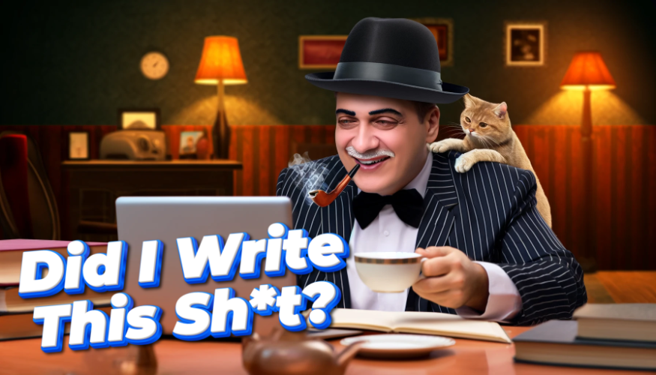Six Principles of Effective Writing
June 03, 2024 •

Experience is the best teacher. I’ve learned much from writing numerous articles over the past few months. These lessons have shaped my writing and helped me improve my content.
These are the most impactful lessons influencing my writing journey.
Balance perfection with completion
Perfection in art is impossible. Completing a creation is better than searching for perfection. It allows you to learn, analyze, critique, and grow. Chasing perfection leaves you unfinished. You never grow or improve because you don’t make mistakes to learn from. We learn more about ourselves from failing as we do from our successes. Sometimes even more. Stepping out of our comfort zone allows us to engage with different writing styles, thought processes, and complex topics. Chasing perfection in one writing style obstructs our ability to improve our writing skills, range, and critical thinking.
I write a lot of technical articles. I write them to educate people on various aspects of software development. I'm never concerned about my grammar or sentence structure. The goal for me is to educate and teach. I have my writer helping me with edits, proofreading, and structure. I like completing these technical articles above being correct. Revisions are easy to make after finishing the article. I'd never get anything done if I chased perfection. I'm doing writing practice, especially with scripts or my YouTube channel. The goal remains to complete as many tasks as possible. My writing skill continually develops doing this and I'm excited to see where I reach. An excellent way to achieve this is by maintaining your productivity. I have written an article to help you with this.
Read: Practical Tips to Maintain Productivity
Subject First
I like focusing on the subject matter. Do not write on topics that you haven’t properly researched or at the very least consulted on. Having a focused point allows you to create the best you can. Writing from an unknown produces substandard work. I prioritize giving my audience the best quality content I can. My approach to this involves planning every step. I do my research, outline, and then write the content with the guidelines I made. This allows me to give my readers content that is easy to ingest and answers every question they have. Clarity is the biggest goal I'd like to achieve. It separates the average writers from the best. The ability to connect with the readers through text is underrated.
Push yourself to create the best you can through your research and diligence. It's best to create a draft that you can revise as needed. This will help you improve your comprehension to make essential alterations. I like staying focused on the subject and using evidence-based examples to drive the point across. It is a strategy that helps me deliver much better content than I used to. I'll explain a concept and then give a practical example with evidence. This has increased my motivation to write well and provide knowledge to my readers. I ensure everything in my videos and articles follows this formula. It's become a distinct part of my writing style and I'm excited for more growth. I have written an article that can help you make excellent drafts focusing on the subject matter.
Read: Make It Beautiful: Preparing Understandable Content Briefs
Visual Content helps
Visual content helps the creative process. It can be anything from videos, pictures, a play, or a recital. Take a topic you’re interested in and add a visual aspect. It will help you build a narrative to spin and develop into a wonderful story. You can only create what you can visualize. I've taken this idea further by adding images and embedded videos into the articles. The reader's perspective is crucial to how well or badly your content is received. Doing this makes my content a bit lengthy but it also makes it more enjoyable to read.
I make sure to use images and videos that are relevant to the article. Context is key. Placing images in the article for the sake will make it a joke. These visual concepts are meant to supplement your writing. I place them in the correct context where they are required. Placing them aimlessly has the potential to make your content an enormous meme. I like writing the content in totality before placing visual aids. This is a rule that I follow to ensure the visual aids are placed correctly. I've seen good returns, especially in my technical content. A simple image or video showcasing all I'm explaining helps my readers understand the point I'm driving across. I knocked out two goals at the same time which is pretty sweet.
Prepare the article title and the image cover before writing
The title is important. It tells everyone what to expect in the written text without giving everything away. It has to be interesting enough to captivate them to find out more. The cover adds to the title. It paints a picture that prompts one to find out more. Together, they work to enchant curiosity in the reader. I like making a title and seeing what I can write from it. It's not the most conventional way to do things but I enjoy the challenge. There's no explicit design or logical order to follow in writing. Creativity and getting your point across is the way to go.
The article image is something I created after writing. It goes against what I have detailed in the heading but I have a good reason for this. I have someone else to create these images for me. I focus on the writing and finetuning of the article. I then get them to make a fitting cover that works with the article. Doing things this way doesn't affect the quality or discourage any creative process. It is a formula that works for me. Creating the article thumbnail is a fun process and so is formulating the title. It gives you a bigger picture of the main points and what to focus on. I can then write about these main points to my heart's content. This is how I get into my element to produce the best work in all I do. I have written an article explaining beautiful principles to help you create wonderful thumbnails.
Read: Thumbnails that Rock! 6 Principles to Follow!
Keep writing even if it’s hard
Nothing good comes easy. Writer’s blocks are common and sometimes you won’t resonate with what you make. Keep pushing through and you’ll discover deeper recesses of your creative prowess. It will find you if you want it bad enough and try hard enough. That’s the basic principle of trying no matter how hard it is. It's hard to admit that you don't have it on any day. The lack of creative workflow and progress can be tough to stomach. The cognitive load alone is enough to make you shudder. These instances are quite common. I've had numerous backs and forth between absolute excellence in my writing and no words to formulate an introduction.
There are days when writing a paragraph is the hardest thing to do. You'll be in the zone on other days and create lengthy texts with good suave words befitting an excellent poem. It's the good and rough that everyone experiences in this writing journey. These variations can occur at any stage in your writing, making it hard to predict and manage. One helpful thing I do as a writer is to take advantage of my peak creative days. I do everything to write and impose my will into the content. This gives me some leeway on my slow creative days.
Writing on such days is hard. There's no way to sugarcoat it. You'll find yourself writing shorter text comprising words and ideas that don't resonate with you. The length of the text is often abysmal and you feel like canning everything. These are the days to double down and push yourself to the limit. Do the opposite of that little voice trying to get you to quit. Days like this can define your character and resolve, building an extensive map of the writer you'll become. Keep going strong. This will help you break through some of the barriers. You'll thank yourself for always pushing even when you didn't feel like it.
Take Feedback and improve
You cannot critique yourself to greatness. You need the opinion of others. Listen to their critiques and feedback. There’s a tool and tip in them to help you get better. Take it on the chin, make changes, and grow. Study the patterns of what makes your articles succeed and fail. These criticisms will help you have the best idea of where your content stands. Do not take it personally. This will help you improve and push your content to the best level. Take the writing advice you receive and use it to enhance your content.
Receiving feedback shows that people have an invested interest in your work. I am a big proponent of giving and receiving feedback. Ironing out the edges to produce the best content is all I want. Feedback is essential to achieving this. I have taken this further by using screen recording software to give and receive feedback. This has drastically improved the efficiency of our feedback mechanisms. I use VideoFeedbackr to achieve this. It helps me give and receive feedback hassle-free. True growth is achievable by pruning the unsightly aspects of your writing. Proper feedback will prune this for you, allowing you to grow as expected. Prioritize your growth. Strive for continuous development. Take the feedback on the chin and use it to grow.
Take away
Everything has its challenges and writing is no exception. These six principles can help you overcome and improve your writing to better levels. I have learned these principles in my writing experience and I’m learning more as I go on. I hope they can help you grow to achieve great things on your creative journey.
FAQs
How can I best implement feedback for my growth?
You should take feedback positively. You can't grow when all you do is fight against the feedback you receive. You can use the feedback to assess the brevity of your work. This will help you make changes to make your work outstanding.
What’s the best visual concept to use?
Use the visual concept that makes the most sense to you. You can use analytics or your creative process to achieve this. Make it something you appreciate and enjoy.
What strategies can I use to overcome writer’s block?
You can study a different topic, go for a walk, or take a short break. Writer's block is frustrating but not permanent. Take some time off and let your creative flow replenish itself.
Is writing a skill that can be improved?
Yes, it is. The more you write the more you pick up. Writing is a skill that improves with continual practice like any other skill.
Where can I learn more about writing?
You can learn a lot. You can learn sentence structure, paragraphs, tenses, and creative styles. Writing has a lot to teach. You'll pick up things as you go and see your ability improve over time.
You can find me on YouTube.


